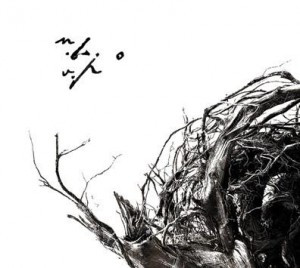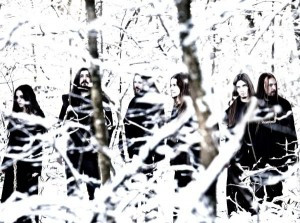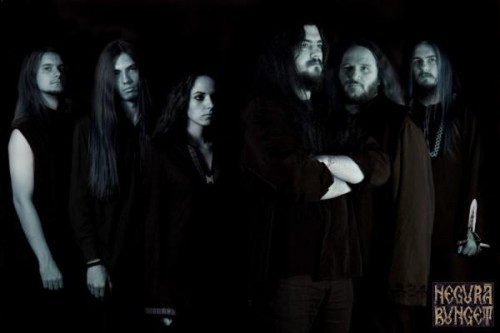In the spring of 2009, undisclosed disagreements led to the departure of two of the three members of Romanian black metal band Negură Bunget. But although founding member Hupogrammos and Sol Faur were on their way out the door, they finished working with co-founder Negru on a re-recording of the band’s 2000 album, Măiastru Sfetnic. The new work, called Măiestrit, was recently released, and as we wrote yesterday, it’s a remarkably impressive work.
With Hupogrammos and Sol Faur gone, Negru set about recruiting a new line-up, including a guitarist and vocalist called Corb and a guitarist called Spin. In all, the new Negură Bunget is a six-piece band constructed to give even more attention to traditional folk instruments. And the new line-up has just released its debut album, Vîrstele Pămîntului (now available on iTunes).
We listened to Măiestrit first, and then wondered how Vîrstele Pămîntului would compare, both in musical style and in quality.
The answer to the first question is that the latter album has moved even further away from black-metal stylings and deeper into the territory of progressive folk metal. But in terms of quality, the re-constituted Negură Bunget has taken no steps backward. The new album is a passionate and entrancing combination of extreme metal and traditional folk melodies and instruments, and we like it a lot. (more after the jump . . .)
 The tone of the album is announced with “Pamint,” the first track. For five minutes, a flute (or pipe) leads an increasingly improvisational folk melody, joined by the strumming of a string instrument, the sound of rapping on a block of wood, and eventually the melodies of a synthesizer and clean vocals. Only in the last minute does the voice turn into a howl and tremolo guitar and metal drumming take over.
The tone of the album is announced with “Pamint,” the first track. For five minutes, a flute (or pipe) leads an increasingly improvisational folk melody, joined by the strumming of a string instrument, the sound of rapping on a block of wood, and eventually the melodies of a synthesizer and clean vocals. Only in the last minute does the voice turn into a howl and tremolo guitar and metal drumming take over.
The songs that follow combine, to varying degrees, poetic, melancholic laments and swift, whirling dances. At the core of almost every song is a melody or combinations or melodies that have a distinctly traditional, folk-music feel to them. We would be more certain about the “traditional” part if we knew more about traditional Romanian folk music. But apart from the melodies that each song explores, the folk-metal feel is attributable significantly to the instruments used and the singing.
The instrumental sounds are remarkably varied. We’re making some educated guesses here, but the songs include what sound like pipes (or flutes), acoustic guitar and other string instruments (a dulcimer?), something that produces the mournful sound of a bassoon (which may be the long Romanian horn called the tulnic), a multitude of traditional percussion instruments (including what sounds like a xylophone) played with tremendous skill and inventiveness by Negru, and piercing whistles.
 Of course, this is also a metal band, and so along with the traditional instruments, the synthesizer is almost always present, along with blistering guitar riffs and occasional double-bass and rapid-attack drumwork. Many of the songs also feature tremolo guitar — but not usually the distorted “wall of sound” effect associated with black metal. Instead, the rapid strumming is clean and clear and melodic, and in places comes across as an electrified substitute for a violin.
Of course, this is also a metal band, and so along with the traditional instruments, the synthesizer is almost always present, along with blistering guitar riffs and occasional double-bass and rapid-attack drumwork. Many of the songs also feature tremolo guitar — but not usually the distorted “wall of sound” effect associated with black metal. Instead, the rapid strumming is clean and clear and melodic, and in places comes across as an electrified substitute for a violin.
The vocals are just as dynamically varied as the instrumentation, but the lyrics are all sung in what we assume is the native Romanian tongue (we can barely understand English, but we’re sure that’s not the language used on this album). From song to song and within songs (except for two purely instrumental tracks), Corb delivers clear, powerful clean singing, raspy growls, high-register shrieks, spoken-word recitals, and insistent whispers.
This is a deeply-felt, exotic collection of music that is rooted in traditional culture while still maintaining the driving aggressiveness of extreme metal. It reminds us, in its stylistic progression from black metal into old forms of traditional music, of Rotting Christ‘s fantastic new album, Aealo, which draws on ancient Greek culture, much as the members of Negură Bunget are now powerfully embracing the instruments and folk sounds of their own country. See what you think — here’s a song from Vîrstele Pămîntului:


Holy crap… where have these guys been all my metal life?!?
This track is nothing short of awesome, and goes beyond that. The other track you posted from them is good, but this one blows it away. Another band to get a position near the top of the “to get” list, in hopes of actually doing so.
Don’t mind me, I stumbled across this blog only a few days ago and have been going through what you’ve posted the past few months…
Don’t mind you? Shit dude, we think it’s so very cool that you’re taking the time to explore what we’ve been doing here! And I’m really glad you like this music. I felt the same way you did (“where have these guys been all my metal life?”) We’re always looking for the kind of metal we’ve never heard before, and this band definitely falls into that category. It’s brilliant stuff.